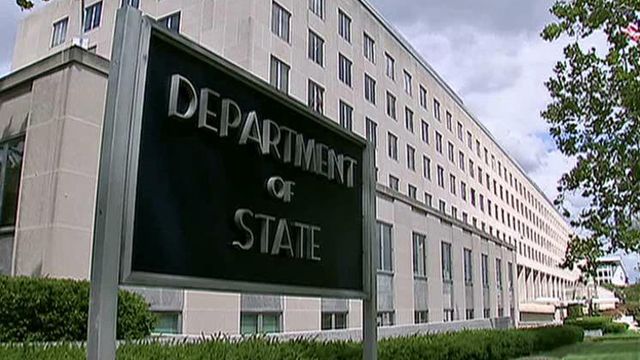As Egypt lurches towards the end of Hosni Mubarak’s regime, one way or another – by “an orderly transition to democratic rule” (as Hillary Clinton delicately puts it), through violent overthrow or simply through the demise of the ailing 82-year-old president – much is unclear. One thing that should not be is that the Muslim Brotherhood is our enemy, and whatever role it plays in Egypt’s future will be to our detriment.
Such clarity is readily available since the Brotherhood (MB or in Arabic, Ikhwan) has told us as much. Consider, for example, the mission statement for the MB found in one of its secret documents entitled “An Explanatory Memorandum on the General Strategic Goal for the Group in North America”:
The Ikhwan must understand that their work in America is a kind of grand Jihad in eliminating and destroying the Western civilization from within and ‘sabotaging’ its miserable house by their hands and the hands of the believers so that it is eliminated and God’s religion is made victorious over all other religions.
As a blue-ribbon group of national security experts convened by the Center for Security Policy, “Team B II” noted in their new best-seller Shariah: The Threat to America, the incompatability of the Ikhwan’s agenda with our interests has been evident from its inception:
The Muslim Brotherhood was founded in Egypt in 1928. Its express purpose was two-fold: (1) to implement shariah worldwide, and (2) to re-establish the global Islamic State (caliphate). Therefore, al Qaeda and the MB have the same objectives. They differ only in the timing and tactics involved in realizing them.
 We also know how the Brotherhood plans to pull off our destruction. Another MB document, this one undated, is called “Phases of the World Underground Movement Plan.” It describes a five-installment program for achieving the triumph of shariah – together with a status report on the realization of several of the phases’ goals:
We also know how the Brotherhood plans to pull off our destruction. Another MB document, this one undated, is called “Phases of the World Underground Movement Plan.” It describes a five-installment program for achieving the triumph of shariah – together with a status report on the realization of several of the phases’ goals:
Phase One: Discreet and secret establishment of leadership.
Phase Two: Phase of gradual appearance on the public scene and exercising and utilizing various public activities. It [the MB]greatly succeeded in implementing this stage. It also succeeded in achieving a great deal of its important goals, such as infiltrating various sectors of the Government.
Phase Three: Escalation phase, prior to conflict and confrontation with the rulers, through utilizing mass media. Currently in progress.
Phase Four: Open public confrontation with the Government through exercising the political pressure approach. It is aggressively implementing the above-mentioned approach. Training on the use of weapons domestically and overseas in anticipation of zero-hour. It has noticeable activities in this regard.
Phase Five: Seizing power to establish their Islamic Nation under which all parties and Islamic groups are united.
If any further evidence were needed of the threat posed by the Muslim Brotherhood, consider the comments on October 6, 2010 by Mohamed Badie, the Ikwan’s virulent promoter of shariah who was installed as its leader (“Supreme Guide”) last year. According to a translation provided by the indispensable Middle East Media Research Institute (MEMRI), Badie declared:
[Today, the United States] is withdrawing from Iraq, defeated and wounded, and it is on the verge of withdrawing from Afghanistan. [All] its warplanes, missiles and modern military technology were defeated by the will of the peoples, as long as [these peoples]insisted on resistance. Its wealth will not avail it once Allah has had his say, as happened with [powerful]nations in the past. The U.S. is now experiencing the beginning of its end, and is heading towards its demise.
Barry Rubin, one of the most astute observers of the Middle East, warned within days that this speech represented a “declaration of war” by the Brotherhood, with it “adopting a view almost identical to al Qaeda’s” but coming from “a group with 100 times more activists than al Qaeda.”
At first blush, it seems incredible that the sort of clarity about the Brotherhood’s intentions that the foregoing provide seems to be eluding many in official Washington and the policy elite. On closer inspection, however, the muddle-headedness that has many describing the Ikhwan as “non-violent,” “democratic” and desirable candidates for a coalition to replace Mubarak’s dictatorship is, to use an old Soviet expression, “no accident, comrade.”
In fact, the aforementioned MB “Explanatory Memorandum” provides a list of “Our Organizations and the Organizations of Our Friends” that includes virtually every prominent Muslim-American organization in business at that time. What is incredible, therefore, is that many of these same Muslim Brotherhood fronts are used by the U.S. government for “outreach” to the Muslim community and policy advice. The nation’s top intelligence official, James Clapper, has actually characterized the resulting “dialogue with the Muslim community” as “a source of advice, counsel, and wisdom.”
As a result, one other thing should be frighteningly clear: We are having our policies towards Egypt’s succession – and the tsunami it is accelerating elsewhere in the region influenced, shaped and probably subverted by the Muslim Brotherhood’s American operatives. If we let our enemies call the shots, there is no doubt who will wind up taking the bullet.



